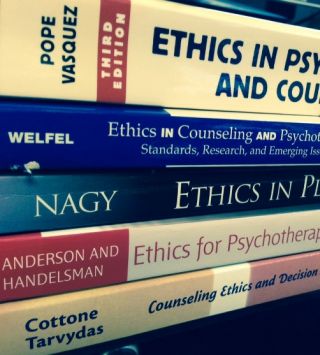Ethics and Morality
Is It Ethical for Professors to Assign Their Own Books?
After all, conflicts are inherent in virtually all professional activities.
Posted April 29, 2015
Several years ago I was in an elevator at my university and a couple publishers reps (those folks who try to persuade professors to adopt their company's textbooks) entered on the fourth floor. After exchanging some pleasantries, one of them asked what book I was adopting for my ethics course.
“I’m using my own,” I replied. “I just co-authored one.”
“Isn’t that a conflict of interest, to use your own book?” The rep replied, half-jokingly.
I decided to reply in the same way: “With the royalties that you publishers pay, no!” We all laughed as we reached the first floor. I was pleased with my little joke, but the question is a serious and interesting one.
I’ve encountered lots of people—students, friends, colleagues, and publishing professionals—who think it’s automatically a conflict of interest for professors to assign their own books. But is it an unethical conflict of interest? After all, conflicts are inherent in virtually all professional activities. For example, when doctors accept money for performing a procedure, they are not acting purely for “the good of the patient.” Professors get paid to teach, so they have interests other than helping students learn. Is it too much of a temptation for professors to assign their own texts? Does the base motive for money unduly contaminate the noble motives to help students?
No. Not under most circumstances. Assigning one’s own textbook (or “course packet,” a collection of readings that the professor prepares specifically for a course) is, on the face of it, ethical.
The American Association of University Professors (AAUP) agrees in their statement on the issue. After all, it makes sense that professors who have taught a course for a long time have developed ideas, ways of expressing relationships among ides, and ways of communicating from which students would benefit. The AAUP says, “In some cases, indeed, students enroll in courses because of what they know about the professor from his or her writings and because they hope to engage in discussion with the professor about those writings in the classroom.” And all that money involved? The AAUP says, “More often than not, the profits are trivial or nonexistent.” My joke wasn’t that funny after all.
But that’s not the end of the story. Lots of professional ethics codes prohibit professors from exploiting their students for personal gain, and sometimes motives do get out of balance. Let’s sharpen our thinking by playing a round of “Both Sides Toward the Middle.” Here are some circumstances in which professors might behave unethically:
- If the book (or course packet) the professor assigns has nothing to do with the course. Pretty unethical, right?
- If the book is relevant, but the professor assigns students to buy the book and then never uses the book in the course.
- If the book is clearly inferior to other available materials. Perhaps the professor self-publishes a book that no other self-respecting instructor would ever adopt.
- If the professor makes grades contingent upon buying new copies of the book—rather than buying or borrowing used copies. One student told me of a professor who assigned a series of exercises in which students submitted “worksheets” from the professor’s book. In this case, it was nearly impossible for students not to buy a new copy of the book.
- If the professor forces other (less powerful) members of the department to use a book they would not have chosen. (However, sometimes departments do choose textbooks by committee for multi-section courses, so the choice of textbook is not always up to each instructor.)
- If the professor puts together a course packet and sells it to students for an exorbitant price—well beyond copying and other costs.

Between these clear alternatives lie the gray areas in which professors have to weigh several factors at the same time. For example, what if a book is marginally relevant, marginally good, and marginally expensive? What if an alternative text is only slightly better than the professor’s book but significantly more expensive?
Now, let’s consider some positive ethics: What can we do to prevent even the appearance of a conflict of interest? The AAUP statement contains examples of policies that some colleges use to mitigate the effects of the profit motive, including requiring departmental and/or college approval, and requiring any profits from the professor’s own students to be donated to a scholarship or library fund at the college. Other policies to prevent exploitation might include:
- having the campus bookstore rather than the professor set the price and sell the course packets. That way the professor doesn’t make a profit.
- providing alternative means for students to get the book (e.g., placing them on reserve at the library—or donating a few copies to library).
- being transparent: Communicate directly to students the reasoning behind the adoption, potential advantages, and what actual profits the professor might make.
- having students collaborate to suggest a charity to which to donate profits, find cheap used copies on the internet, etc.
Of course, digital books and other technological advances are changing the landscape somewhat. But conflicts of interest will remain.
In conclusion, I believe that really ethical professors should have the decency to win the lottery and buy copies of their textbooks (and autograph them) for all their students.
=======================
Mitch Handelsman is a professor of psychology at the University of Colorado Denver. His most recent book is a collaboration with pioneering musician Charlie Burrell on Burrell’s autobiography. Mitch is also the co-author (with Sharon Anderson) of Ethics for Psychotherapists and Counselors: A Proactive Approach (Wiley-Blackwell, 2010), and an associate editor of the two-volume APA Handbook of Ethics in Psychology (American Psychological Association, 2012).
© 2015 by Mitchell M. Handelsman. All Rights Reserved




